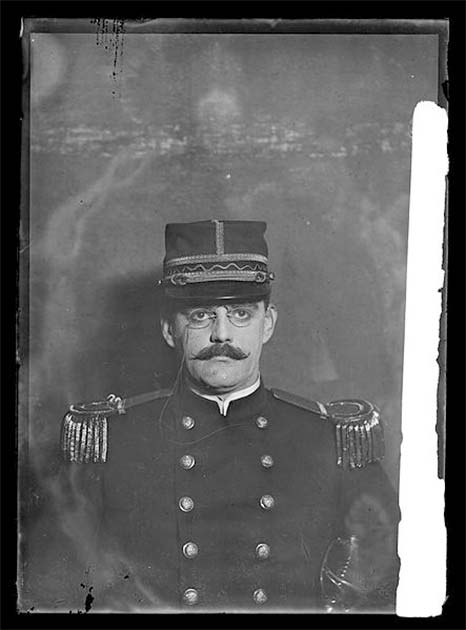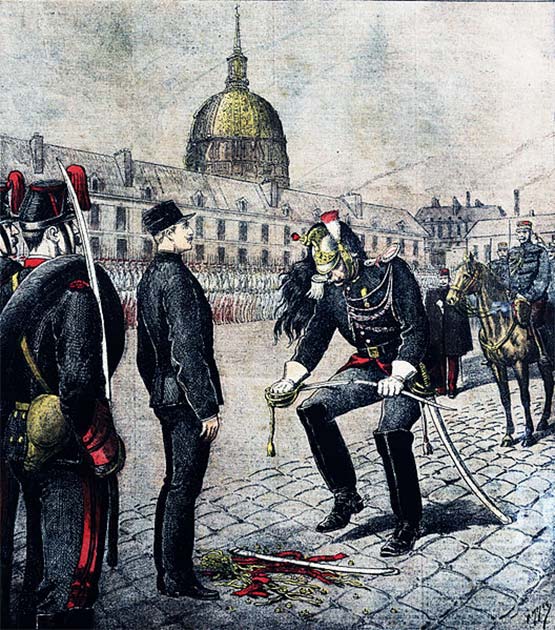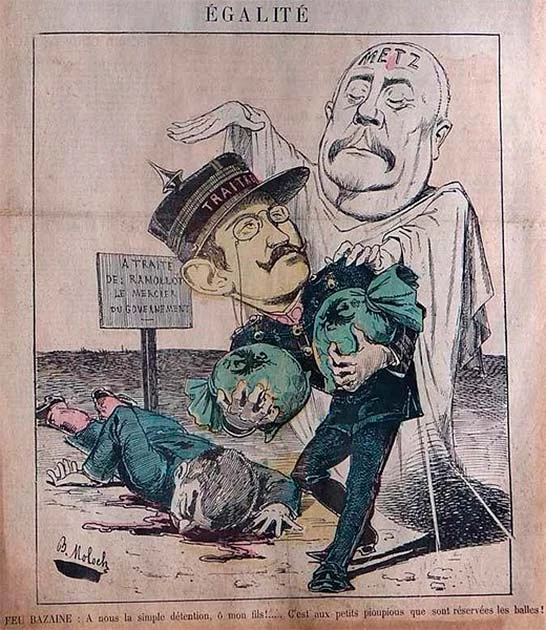At the turn of the 20th century, an indelible mark as left on the French nation’s conscience Known as the Dreyfus Affair, this dark chapter in French history was, at its core, a saga of false accusation, wrongful imprisonment, political intrigue, and antisemitism.
But there was light in the darkness. The Dreyfus Affair may have been a scandal but there were those who fought for what they believed was right. In particular Emile Zola’s “J’Accuse…!” became a beacon of hope and a symbol of all the good a free press can do. This is the story behind what many dubbed the “court case of the century.”
The Accusation
The whole Dreyfus affair began in 1894 with a shocking allegation that tore one innocent man’s life apart. Alfred Dreyfus, a Jewish French army officer, was arrested and accused of spying for the German Empire. The accusation itself stemmed from a handwritten document, the “bordereau,” which was found by Madame Marie Bastian, a cleaning woman who worked at the German Embassy in Paris, and who was also a French spy.
The document appeared to contain details of French military secrets and the cleaner quickly delivered it to Commandant Hubert-Joseph Henry, who worked for French counterintelligence at the time. Henry began an investigation and quickly landed on Dreyfus as his suspect, but the evidence was dubious at best.

The document was riddled with grammatical errors and inaccuracies, leading some to suspect that it was a forgery. Professional handwriting experts were brought in who looked at the handwriting on the document and that of Dreyfus. They declared that Dreyfus must be guilty. The fact the document was full of errors, and the fact Dreyfus’s handwriting was nothing like that on the bordereau clearly meant the document was a “self-forgery.”
Basically, the French military’s argument boiled down to the idea that the evidence was bad because Dreyfus had purposely written it to look that way in case it was ever found. Despite the lack of concrete proof, the French military, under pressure to find a culprit for the leaks of sensitive information, focused their investigation on Dreyfus.
But the military hadn’t chosen just any scapegoat, they’d picked one who was specifically Jewish. The army’s decision to target Dreyfus was influenced by anti-Semitic sentiments prevalent in French society at the time.
Being of Jewish descent, Dreyfus became an easy scapegoat for those seeking to explain the security breaches. The flawed logic that a Jewish officer must be disloyal to France fueled the false accusation.
If this wasn’t all damning enough the poor man’s arrest and subsequent court-martial were shrouded in secrecy, being held behind closed doors. The trial lacked both transparency and due process with Dreyfus never really being allowed to defend himself.
- The Tour de Nesle Affair: Scandal, Adultery and the End of the House of Capet
- Who was Mrs. Silence Dogood? The Youthful Pranks of Benjamin Franklin
The military tribunal, influenced by the prevailing anti-Semitic attitudes, swiftly found Dreyfus guilty of treason. His sentence was life imprisonment on Devil’s Island, a remote penal colony in French Guiana. Dreyfus’s family, especially his brother, Mathieu, fought the conviction but for a time their pleas fell on unsympathetic (and antisemitic) deaf ears.
At the same time as this was all going on Colonel Georges Picquart, head of counterespionage for France, found evidence that another man, Major Ferdinand Walsin Esterhazy, was actually the spy. He took this evidence to the General Staff who refused to even consider it. When the Colonel complained he found himself reassigned to an undesirable position in North Africa.

The false accusation and wrongful conviction of Alfred Dreyfus highlighted not only a miscarriage of justice but also exposed the corrosive effects of anti-Semitism within the French military and society at large. It set in motion a series of events that would ultimately lead to the unraveling of this grave injustice and the vindication of Dreyfus’s innocence.
Emile Zola’s “J’Accuse…!”
Things took a dramatic turn when the acclaimed French writer Emile Zola stepped into the fray. Born on 2 April 1840, Zola was famous for writing Les Rougon-Macquart, a collection of 20 novels about Paris during the French Second Empire. He was also the founder of the Naturalist movement in literature and an important public figure besides, having been made an Officer of the Legion of Honor by President Raymond Poincare in 1893.
Zola, simply put, was a man that people respected and listened to. But in 1894 he risked his entire career by penning a scathing open letter, “J’Accuse…!” and addressing it to the French president. This bold exposé was published in the newspaper L’Aurore and sent shockwaves through French society.
In it, he accused the French government and the military establishment of knowingly wrongfully convicting Dreyfus and of antisemitism. But this was no mere opinion piece, it was a strategic move.
Zola wrote the letter as broadly as he could, hoping that the government would sue him for libel. As soon as the suit was filed Zola and his allies could finally access and publicize the flawed evidence that Dreyfus had been sentenced on.
The letter was full of allegations against the French government, pointing out countless holes in the evidence, how Dreyfus had been mistreated, and calling for a re-examination. His letter was a powerful indictment of the corruption and anti-Semitism that had tainted the affair.
The consequences for Zola were swift and severe. His letter made him a target of the government and its supporters. He was charged with libel and faced the prospect of imprisonment. In a courageous act, Zola fled France to avoid incarceration, seeking refuge in England. That same year he was stripped of his officer rank in the Legion of Honor.
- Crown Prince Rudolph And The Mayerling Incident: Suicide Or Murder?
- Marguerite Alibert: Courtesan, Murderess and Blackmailer of a King
Zola’s “J’Accuse…!” was not only a pivotal moment in the Dreyfus Affair but also a testament to the power of the press and an individual’s commitment to justice. It galvanized public opinion, leading to widespread support for Dreyfus and the reexamination of his case.
Public Outcry
Emile Zola’s “J’Accuse…!” ignited a firestorm of public outrage, especially among the country’s intellectuals, and debate across France. Supporters of Alfred Dreyfus, known as Dreyfusards, rallied behind Zola’s call for justice. In contrast, anti-Dreyfusards, including high-ranking military officials, staunchly defended the original verdict.

The public outcry reached a fever pitch as more evidence of Dreyfus’s innocence came to light. Pressure mounted on the French government to reexamine the case, and eventually, they relented. The Dreyfus Affair had evolved from a scandalous secret into a national crisis, forcing France to confront its own prejudices and flaws in the justice system.
This doesn’t mean it didn’t take years for Dreyfus to be freed. His case had torn France into two opposing factions, the pro-republican, anticlerical Dreyfusards and pro-Army, mostly Catholic “anti-Dreyfusards”. The French government was aware it had to step extremely carefully not to set either side off. Justice for Dreyfuss was the last thing on its mind.
Dreyfus was returned to France for a second trial in 1899. In an attempt to appease both sides, he was once again found guilty and sentenced to serve ten years for his “crimes.” He was then pardoned and released.
It wasn’t until 1906 that Dreyfus was finally exonerated and reinstated in the French army. The real spy, Major Ferdinand Walsin Esterhazy, was eventually identified and court-martialed, confirming Dreyfus’s innocence once and for all.
Amazingly Dreyfus continued to serve the country that had so badly betrayed him. After being reinstated as a major he served during WWI, earning the rank of Lieutenant Colonel. To acknowledge the injustice he had suffered, Dreyfus was awarded the Légion d’honneur, a prestigious French medal.
The Dreyfus Affair remains a haunting chapter in French history, bearing witness to the destructive power of prejudice, corruption, and the consequences of a rush to judgment. Alfred Dreyfus’s false accusation and subsequent exoneration serve as a stark reminder of the importance of upholding justice and protecting the rights of individuals, regardless of their background.
Emile Zola’s fearless “J’Accuse…!” and the ensuing public outcry played pivotal roles in exposing the truth and righting a grievous wrong. This affair had profound consequences, leading to reforms in the French military and legal systems. It stands as a powerful reminder of the importance of the enduring pursuit of justice and equality in the face of adversity, leaving a lasting legacy that continues to resonate today.
Top Image: J’Accuse! Zola’s famous letter brought attention to the Dreyfus Affair. Source: Emile Zola / Public Domain.